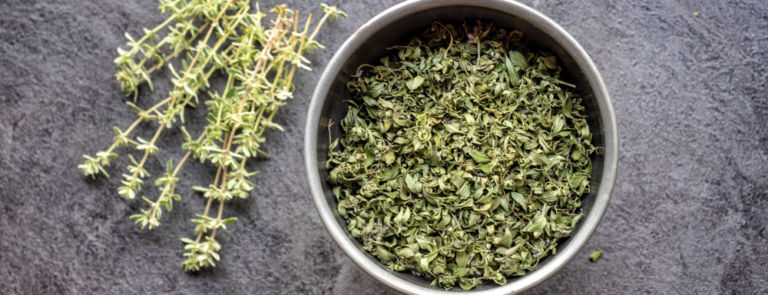20% off €35
Code:EASTER
Thyme health benefits

Though popular in stews and grilled recipes, there's more to thyme than meets the eye. Find out the different health benefits it holds here.
Thought thyme was just something you throw into stews to add a little extra flavour? There’s actually a whole lot more to this fragrant Mediterranean herb than first meets the eye!
What is thyme?
Thyme is a type of herb which you may be surprised to learn is a relative of mint. Its distinctive taste has made it a common ingredient in many hearty dishes, including stews, soups, and roast dinners. Before adding a unique peppery flavour to food, thyme was used for things like embalming by the Egyptians and even as incense by the Ancient Greeks. Thyme leaves and oil have long been used as herbal remedies to treat a whole range of common health issues1 .Thyme health benefits2
As well as its unique smell and taste, thyme has various potential health benefits for both the body and the skin.- Has microbial properties – thyme is a biocide, a type of compound studied for its ability to fight harmful organisms in the body3
- Rich in vitamin C – thyme is a good source of vitamin C needed by the body to help boost the immune system, maintain healthy skin and protect the cells.4
- Contains various vitamins and minerals – thyme is a source of other nutrients, including iron, copper, and manganese.
- Is an anti-inflammatory – thyme has long been used as a natural pain relief thanks to its anti-inflammatory properties. Because of this (and its anti-microbial benefits), thyme is sometimes used in skin products to treat acne5.
How to include more thyme in your diet8
With its excellent nutritional profile and ability to enhance food’s flavour, there’s no reason not to add thyme to more dishes! When it comes to food, you can either buy it dried or fresh in a sprig or as a whole plant. Here are a few ways to eat more thyme:- Add dried thyme to a vegetable stew along with complimentary herbs like sage, rosemary, or oregano.
- Make homemade vegetarian stuffing by combining breadcrumbs, chopped onion, butter, egg and fresh thyme leaves.
- Toss some dried thyme into a salad dressing or use it with oil and other herbs to marinate vegetables before roasting.
- Level up your omelettes with some thyme, pepper, and garlic powder.



